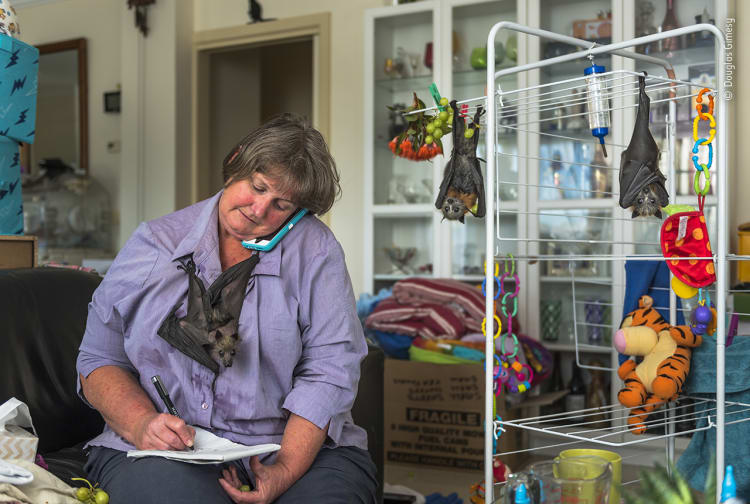Newsbites + Other Bits: A Weekly Roundup (vol. 4)

This is one of the many eye-popping nominees for the Wildlife Photographer of the Year's People's Choice Award. This is wildlife rehabilitator, Julie Malherbe, taking a call to assist the next animal rescue while looking after three orphaned grey-headed flying-foxes in Australia. Douglas Gimesy/Wildlife Photographer of the Year Nominee/Natural History Museum
A weekly edition of content I think you'd like to read, listen to, and watch
It's hard to think about climate change during this awful pandemic. But it has shown us in real-time what happens when people dismiss science and decision-makers bypass scientific recommendations to prioritize the economy (Have you ever seen a dead person shopping or dining out? Yeah, me neither).
Climate change is the biggest threat to our global economic and social stability. Scientists have warned us for years about the devastating consequences of rising global temperatures. We need to use the lessons we're learning from this pandemic to tackle the climate emergency.
We can't defeat climate change by isolating in our homes, wearing masks, or vaccinating against it. Pretending it isn't there won't make it go away.
Keeping informed on climate change and its effects is one way to understand what it means and how to cope with it. New reports this week make it clear that action on the climate is badly overdue. We have to start demanding more and better from our leaders.
❤️ Be kind to yourself and others. Have a good weekend.
📖 To Read
- Not mincing any words. On Wednesday, the United Nations (UN) warned that humanity is waging what it describes as a "suicidal" war on nature. This is a good summary on the "searing indictment" of the UN Secretary-General Antonio Guterres on the "broken" state of the planet.
- They claim to go green but plan to do the exact opposite. A report by the United Nations Environment Programme (UNEP) and its research partners shows that governments around the world are "doubling down" on fossil fuels. Despite the urgent need to cut carbon emissions to avoid a planetary catastrophe, the report states Canada and seven other major energy producers plan to increase the production of fossil fuels by two per cent a year.
- In Canada, the economic, social, and environmental costs of climate are spiralling. The independent, publicly funded Canadian Institute for Climate Choices reveals in its latest report, we know very little of these costs. And what we know, we barely understand, but it's nothing short of alarming: disaster costs from 2010 to 2019 were over $14 billion. This is the same amount as over the previous 40 years.
- Nothing gold can (and probably will) stay because of climate change. A study on European forest trees shows climate change will cause autumn leaves to fall earlier in the year. For decades a pattern has been developing where leaves keep falling sooner. This is affecting the capacity of forests to absorb carbon dioxide (CO2).
- Resilience to climate change as a tool to confront this pandemic. This report from Inside Climate News, explains how the people from Lombok Island in Indonesia used their planning for frequent climate change disruptions to successfully limit the spread of COVID-19.
👂 To Listen
Detecting COVID-19 through sound?🤞This is a fascinating story on scientists who are working on narrowing down who should be tested for COVID-19 by using sounds hidden in human vocal cords. (From the Here & Now podcast, a production by NPR and WBUR Boston.)
👁️ To Watch
Mesmerizing cinematography. Take a break and indulge your pupils with the beautiful and evocative nature-focused editorial and commercial videos from Canadian filmmaker Goh Iromoto.
🎇 Other Bits
For chess aficionados or fans of The Queen's Gambit. Meet the incredible Vera Menchik, a real-life Beth Harmon. Also, don't miss this beautiful and insightful homage to the world chess champion's life. It helps to understand why Menchik's rise to fame in the deeply patriarchal and xenophobic early 20th century is nothing short of an astounding achievement.👏
👀 Did I miss anything? Make a mistake? Let me know. Share with me your thoughts, suggestions, or critiques. Follow me on Twitter: @e_sarin. Or email me at: elenasosalerin@gmail.com.